The Executive in Residence (EIR) program enhances students’ contact with and knowledge about the world of practice. The EIR meets with students both collectively and individually throughout the academic year regarding career development, professionalism and leadership.
 2024-25: Nick Vizzoca
2024-25: Nick Vizzoca
Nick Vizzoca is President of The Center for Healthcare Solutions, formerly The Healthcare Council of Western Pennsylvania, a regional trade association representing a continuum of health care providers in a 30-county area of western Pennsylvania and northern West Virginia. The Center serves as a neutral convening authority where members work collaboratively to address healthcare concerns and share best practices.
Vizzoca is a dynamic and well-known health care executive in the Pittsburgh region and a Pittsburgh native. He has been an executive at both Highmark and UPMC. Most recently, he was the president and CEO at Vincentian Collaborative System, where he oversaw a financial turnaround, rebranding, repositioning and forward-thinking leadership in the health care industry’s response to COVID-19.
Vizzoca authored the 2021 executive development book When Leadershi* Hits the Fan. Packed with lessons learned, powerful true stories, inspirational analogies and practical exercises, each chapter is designed to help address tough questions that lead to maximizing productivity, happiness and ultimately, the bottom line.
He is also the founder and president of Derma Vivere, a member of the board of directors of the World Tumor Registry and is often consulted on everything from strategy and employee engagement to crisis management in his never-ending personal mission to better the lives of others. Vizzoca holds a BA from the University of Pittsburgh and an MBA from Point Park University.
Previous EIRs
- 2022–2024: John Harrington
-
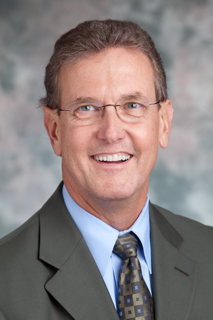
John Harrington has over 40 years of healthcare experience, all of it in Arizona. His journey took him through 11 different hospitals, seven of which Mr. Harrington served as Chief Executive Officer. His last permanent assignment was as Senior Vice President/CEO of Honorhealth Deer Valley Medical Center. He led Deer Valley Medical Center to Magnet status as well as their conversion to The Joint Commission from another accreditation body. In his role as Senior Vice President, he was charged with the development of a free-standing emergency department and outpatient center. This led to planning and development of Honor health’s sixth hospital. Mr. Harrington retired in May 2017, before the project was completed in 2021.
Shortly after his retirement, Mr. Harrington took an interim position as Chief Administrative Officer of Flagstaff Medical Center, part of Northern Arizona Healthcare. He held that position for 13 months at which time a permanent replacement was hired. At that time, Mr. Harrington fully retired.
Mr. Harrington excels at physician relations, financial performance, and strategic planning. He earned both his Master of Public Health and his Bachelor of Science in Microbiology from the University of Pittsburgh. He was an active member of ACHE, since 1978, serving as Regent of Arizona from 2003-2005, and served as an ACHE Governor from 2012-2015. He received the ACHE Exemplary Service Award in 2017. He’s been involved in several local and national boards.
- 2021–2022: Christopher Gessner
-
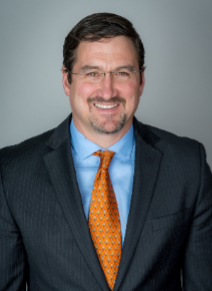 Christopher Gessner is currently the president and chief executive officer of University of Colorado Hospital (UCH), a nationally recognized academic medical center with almost 700 inpatient beds and 6,000 employees. UCH is the only academic medical center in Colorado and is the academic hub of the UCHealth system. As CEO of UCH, Gessner oversees other UCHealth locations in metro Denver including Broomfield Hospital, Highlands Ranch Hospital and numerous ambulatory medical centers.
Christopher Gessner is currently the president and chief executive officer of University of Colorado Hospital (UCH), a nationally recognized academic medical center with almost 700 inpatient beds and 6,000 employees. UCH is the only academic medical center in Colorado and is the academic hub of the UCHealth system. As CEO of UCH, Gessner oversees other UCHealth locations in metro Denver including Broomfield Hospital, Highlands Ranch Hospital and numerous ambulatory medical centers.Beginning in October 2021, Gessner will transition to a new role as president and chief executive officer of Akron Children's Hospital in Akron, Ohio.
Prior to UCH, Gessner was the president of UPMC Children’s Hospital of Pittsburgh and UPMC Western Psychiatric Hospital where he led initiatives to advance patient care, improve access for patients and elevate the overall health care experience. He launched several care delivery innovations including an array of virtual health services, embedding behavioral health services in primary care and subspecialty practices and the creation of strategic liver transplant and cardiovascular partnerships in national markets.
Gessner excels at partnering with physicians and other clinicians and enabling teams with diverse backgrounds and skill sets to work across organizational boundaries and deliver exceptional performance. He also has extensive experience in payer-provider contracting and relationships having worked at both Highmark Blue Cross and Blue Shield and Geisinger Health System early in his career.
Gessner earned master’s degrees in health care administration and business from the University of Pittsburgh and a bachelor’s degree in economics from the College of William and Mary. Mr. Gessner enjoys spending time with his wife, Jane, and three children.
- 2020–2021: Deborah Brodine
-
 Deborah S. Brodine, MHA, MBA is the president of UPMC Western Psychiatric Hospital (WPH) and the Behavioral Health Services Network of UPMC. Western Psychiatric is integrated with the Department of Psychiatry of the University of Pittsburgh School of Medicine and the psychiatric division of University of Pittsburgh Physician Practice. Psychiatric services are provided by over 200 psychiatrists and psychologists at 19 UPMC hospitals with a total of 488 inpatient psychiatry beds, consultation and liaison services, and over 85 ambulatory programs. Ms. Brodine also serves as president of UPMC Senior Services, which encompasses the heath system’s home health, hospice, community-based care; and senior living and skilled nursing capabilities. UPMC Senior Services provides over 700,000 home health visits and over 50,000 home health admissions annually, supports a hospice average daily census over 520, and serves over 2,200 seniors daily in skilled nursing, assisted living, personal care, independent living, and CCRC communities.
Deborah S. Brodine, MHA, MBA is the president of UPMC Western Psychiatric Hospital (WPH) and the Behavioral Health Services Network of UPMC. Western Psychiatric is integrated with the Department of Psychiatry of the University of Pittsburgh School of Medicine and the psychiatric division of University of Pittsburgh Physician Practice. Psychiatric services are provided by over 200 psychiatrists and psychologists at 19 UPMC hospitals with a total of 488 inpatient psychiatry beds, consultation and liaison services, and over 85 ambulatory programs. Ms. Brodine also serves as president of UPMC Senior Services, which encompasses the heath system’s home health, hospice, community-based care; and senior living and skilled nursing capabilities. UPMC Senior Services provides over 700,000 home health visits and over 50,000 home health admissions annually, supports a hospice average daily census over 520, and serves over 2,200 seniors daily in skilled nursing, assisted living, personal care, independent living, and CCRC communities.Ms. Brodine has over 25 years of experience in health care leadership. During that time, Ms. Brodine has led the navigation of numerous payer-provider and value-based care model efforts on behalf of UPMC in the post-acute and in community-based care. These efforts include contracting with the Center for Medicare & Medicaid Innovation Center (CMMI) for nursing home models that reduce avoidable hospitalizations, and the design and implementation of care model pilots in home health, in community-based pharmacy, and in home-based palliative and supportive care, which are designed to preserve independence and quality of life, and which often, engage innovative technologies. Ms. Brodine has extensive history of business development, including de novo geographic growth, acquisition and integration, and joint ventures and strategic partnership arrangements on ancillary services in laboratory services, pharmacy, dialysis, radiology, occupational medicine, and PACE programming. In collaboration with colleagues from the University of Pittsburgh, Ms. Brodine has provided leadership and direction to the Aging Institute of UPMC and the University of Pittsburgh, the UPMC Palliative and Supportive Institute, and community-based programs of the Rehabilitation Institute, including UPMC’s Disabilities Resource Center.
She obtained her MBA and MHA from the University of Pittsburgh and her BS in Economics from Carnegie Mellon University.
- 2019–2020: Robert Curry
-
 Robert H. Curry has been the President & CEO of Emanate Health since November 2008. He joined Emanate Health after serving in the same capacity for five years at O'Connor Hospital in San Jose, Calif. Before coming to O'Connor Hospital, Rob was CEO of Thunderbird Medical Center, a 640-bed Banner Health System hospital in Phoenix, Arizona, for 13 years. During four of those years, he also served as CEO of Maryvale Samaritan Medical Center, a 340-bed community hospital that was an affiliate within the Banner Health System. Rob also has held executive positions with hospital systems in Youngstown, Ohio, and Pittsburgh, Pennsylvania.
Robert H. Curry has been the President & CEO of Emanate Health since November 2008. He joined Emanate Health after serving in the same capacity for five years at O'Connor Hospital in San Jose, Calif. Before coming to O'Connor Hospital, Rob was CEO of Thunderbird Medical Center, a 640-bed Banner Health System hospital in Phoenix, Arizona, for 13 years. During four of those years, he also served as CEO of Maryvale Samaritan Medical Center, a 340-bed community hospital that was an affiliate within the Banner Health System. Rob also has held executive positions with hospital systems in Youngstown, Ohio, and Pittsburgh, Pennsylvania.Rob was recognized by the Los Angeles Business Journal as one of the 500 most influential community and business leaders reshaping Los Angeles County in 2019. He serves as the Board Chair for Private Essential Access Community Hospitals (PEACH)–a network of private, core safety net hospitals in California that care for a disproportionate share of low-income, medically vulnerable patients. Rob is currently a Fellow in the American College of Healthcare Executives. He serves on the board of directors for the California Hospital Association and also serves as a member of its executive committee. Rob previously served as a member on the board of the American Hospital Association, Region 9.
He previously served as a member of the Southern California Hospital Council, and while in San Jose, he served as a board member and chair of the Northern California Hospital Association. Additionally, while in Phoenix, Rob served on the board of the Arizona Hospital Association. Throughout his career, Rob has been involved in numerous service organizations and community boards including: the American Heart Association, United Way, YMCA and Rotary International. Rob holds a Bachelor of Arts in Economics and a Master’s in Public Health Administration, both from the University of Pittsburgh.
- 2018–2019: Louis Shapiro
-
 Louis Shapiro has served in his role as president and CEO for the Hospital for Special Surgery since October 2006, overseeing all strategic and operational aspects of HSS and fulfilling its mission—to advance the field of musculoskeletal medicine through world-class patient care, research, and education. Under his leadership, HSS has experienced significant growth, expansion of facilities, and recognition as the world leader in its specialty areas of orthopedics, rheumatology, and their related disciplines. The Hospital for Special Surgery has been nationally ranked #1 for Orthopedics for the past eight consecutive years by U.S. News & World Report, and currently ranks #3 for rheumatology.
Louis Shapiro has served in his role as president and CEO for the Hospital for Special Surgery since October 2006, overseeing all strategic and operational aspects of HSS and fulfilling its mission—to advance the field of musculoskeletal medicine through world-class patient care, research, and education. Under his leadership, HSS has experienced significant growth, expansion of facilities, and recognition as the world leader in its specialty areas of orthopedics, rheumatology, and their related disciplines. The Hospital for Special Surgery has been nationally ranked #1 for Orthopedics for the past eight consecutive years by U.S. News & World Report, and currently ranks #3 for rheumatology.Shapiro is a strong proponent of the link between internal culture and performance and his philosophy of continuous improvement has led to outstanding results. Patient satisfaction scores at HSS have consistently been among the highest in the nation. This attention to quality is also evident in the HSS low infection and complication rates. Patients travel from all 50 U.S. States and more than 100 countries to HSS for its unsurpassed diagnostic and clinical expertise.
HSS has received the prestigious Gallup Great Workplace Award twice for the most engaged workplaces in the world.
Shapiro has more than 30 years of healthcare experience, including as executive vice president and chief operating officer of Geisinger Health System in Pennsylvania, and as a leader in the health care practice at McKinsey & Company.
Shapiro serves on multiple boards including Move Mountains Foundation and Greater New York Hospital Association, of which he is a past chairman.
- 2017–2018: Tom Sadvary
-
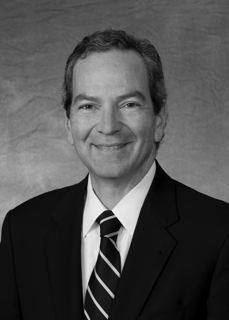 Tom Sadvary currently serves as a senior advisor to the HonorHealth CEO and chairman of the board. He is also an adjunct faculty member of the Arizona State University School for the Science of Healthcare Delivery. He was appointed president and CEO of Scottsdale health care in 2005 following progressive executive roles after joining the organization in 1986 as administrator of Scottsdale Healthcare Shea Medical Center. He began his career at the University of Pittsburgh Medical Center and Barberton Citizens Hospital. Tom earned his bachelor of arts degree from Allegheny College and his master’s degree in public health from the University of Pittsburgh. He also worked as a paramedic prior to attending graduate school.
Tom Sadvary currently serves as a senior advisor to the HonorHealth CEO and chairman of the board. He is also an adjunct faculty member of the Arizona State University School for the Science of Healthcare Delivery. He was appointed president and CEO of Scottsdale health care in 2005 following progressive executive roles after joining the organization in 1986 as administrator of Scottsdale Healthcare Shea Medical Center. He began his career at the University of Pittsburgh Medical Center and Barberton Citizens Hospital. Tom earned his bachelor of arts degree from Allegheny College and his master’s degree in public health from the University of Pittsburgh. He also worked as a paramedic prior to attending graduate school.Tom is a fellow in the American College of Healthcare Executives. His community leadership roles have included the Arizona Hospital and Healthcare Association, Scottsdale Area Chamber of Commerce, Scottsdale/Paradise Valley YMCA, Scottsdale McDowell Road Task Force, Scottsdale Rotary Club, and Phoenix Chamber of Commerce. He continues to lead the community and professional development through involvement in the American Hospital Association, Greater Phoenix Leadership Council, Scottsdale Institute and Health Insights.
Tom and his wife, Mary, a registered nurse, have been married for 39 years. Their two children, Christopher and Rachel, attended undergrad and graduate schools in Arizona. Tom enjoys playing golf, hiking, and traveling with his family.
- 2016–2017: Scott Becker
-
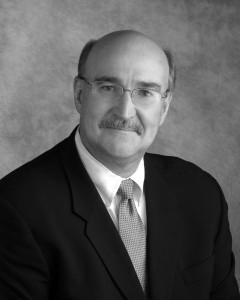 Scott Becker is the past chief executive officer of Conemaugh Health System. Strategic planning characterized his leadership from the time he assumed his position in 2005 until his retirement in 2016. He previously served as vice president, hospital and mid-market sales with Highmark Blue Cross Blue Shield in Pittsburgh. Prior to that, he held top leadership positions at the University of Pittsburgh Medical Center (UPMC) Health System, where he served as chief operating officer of the hospital division. Career highlights also include his role as president and chief executive officer of Butler Regional Health System and chief operating officer of Monongahela Valley Hospital. Becker is active at the local, regional and national level, serving on numerous advisory boards including the Hospital and Healthsystem Association of Pennsylvania where he was recently elected chair-elect. In addition to his community service, he is a frequent national speaker on health care strategic planning and quality.
Scott Becker is the past chief executive officer of Conemaugh Health System. Strategic planning characterized his leadership from the time he assumed his position in 2005 until his retirement in 2016. He previously served as vice president, hospital and mid-market sales with Highmark Blue Cross Blue Shield in Pittsburgh. Prior to that, he held top leadership positions at the University of Pittsburgh Medical Center (UPMC) Health System, where he served as chief operating officer of the hospital division. Career highlights also include his role as president and chief executive officer of Butler Regional Health System and chief operating officer of Monongahela Valley Hospital. Becker is active at the local, regional and national level, serving on numerous advisory boards including the Hospital and Healthsystem Association of Pennsylvania where he was recently elected chair-elect. In addition to his community service, he is a frequent national speaker on health care strategic planning and quality.Becker holds master’s degrees in public health and business administration from the University of Pittsburgh and a bachelor’s degree in economics from Washington and Jefferson College. He served as an academic preceptor for a variety of graduate public health programs including those at the University of Pittsburgh, Robert Morris University, West Virginia University, and the University of Minnesota. He is currently a fellow in the American College of Healthcare Executives.
- 2015–2016: Mark Sevco
-
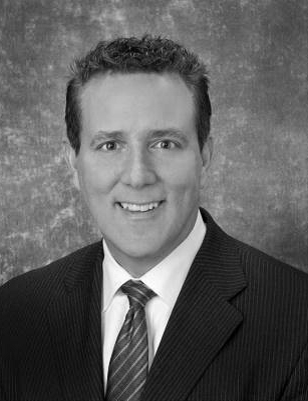 Mark Sevco is the president of UPMC East, the newest community hospital (opened July 2, 2012) in the Pittsburgh-based UPMC system and, effective July 1, 2014, president of UPMC McKeesport. In this dual role, He is responsible for business development and strategic planning in support of the successful operation of UPMC East and UPMC McKeesport. This includes enhancing integration and collaboration with physicians and the surrounding communities. Sevco works closely with the medical staff on each hospital campus to enhance and improve clinical practice and recruits new medical staff to support the vision and goals of UPMC East, UPMC McKeesport, and the entire UPMC system.
Mark Sevco is the president of UPMC East, the newest community hospital (opened July 2, 2012) in the Pittsburgh-based UPMC system and, effective July 1, 2014, president of UPMC McKeesport. In this dual role, He is responsible for business development and strategic planning in support of the successful operation of UPMC East and UPMC McKeesport. This includes enhancing integration and collaboration with physicians and the surrounding communities. Sevco works closely with the medical staff on each hospital campus to enhance and improve clinical practice and recruits new medical staff to support the vision and goals of UPMC East, UPMC McKeesport, and the entire UPMC system.Sevco has served UPMC in various capacities for more than 20 years. Prior to his tenure as President of UPMC East, he served as vice president of Operations for UPMC Presbyterian Shadyside, where he was responsible for the operational aspects of surgical services, cardiology services, physician services, imaging centers, parking, and security. Prior to that, heserved as president of UPMC Braddock, executive director of the Department of Pediatrics at Children’s Hospital of Pittsburgh of UPMC, executive director and vice president of the UPMC Cardiovascular Institute, and business planning and development associate for Magee-Womens Hospital of UPMC.
Sevco holds a bachelor’s degree in applied mathematics, a master’s degree in business administration, and a master’s degree in health administration from the University of Pittsburgh. Sevco serves on several boards, including those of the EAST District Regional Council of the YMCA of Greater Pittsburgh, the UPMC Emergency Resource Management Corporation, and the Pittsburgh Chapter of the American Heart Association. He is active in his community.
Sevco, his wife, Christine, and their three children live in the Gibsonia area north of Pittsburgh.
- 2014–2015: Ray Grady
-
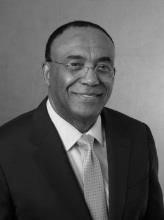 Ray Grady, FACHE, is a health care executive with extensive experience in the field of health care management. He previously served as the chief administrative officer of Aurora Healthcare, a 15 hospital integrated delivery system. In that position he provided strategic oversight of system wide initiatives in supply chain management and clinical research at Aurora Ventures, the for-profit arm of Aurora. Prior to joining Aurora Health Care, he spent the most of his career at Northshore University Health System just north of Chicago, where he served as president and CEO of Evanston Hospital, flagship of the NorthShore University Health System.
Ray Grady, FACHE, is a health care executive with extensive experience in the field of health care management. He previously served as the chief administrative officer of Aurora Healthcare, a 15 hospital integrated delivery system. In that position he provided strategic oversight of system wide initiatives in supply chain management and clinical research at Aurora Ventures, the for-profit arm of Aurora. Prior to joining Aurora Health Care, he spent the most of his career at Northshore University Health System just north of Chicago, where he served as president and CEO of Evanston Hospital, flagship of the NorthShore University Health System.Grady has worked on issues related to health care reform on a national level as part of his service on the American Hospital Association Board of Trustees. He is a fellow in the American College of Healthcare Executives and has chaired the Illinois Hospital Association, The Institute for Diversity, and the Commission on Accreditation of Health Care Management Education. He serves on the board of the Association of University Programs in Hospital Administration and is a trustee on the board of directors of Northwest Community Healthcare in the Chicago area. He has also served on the adjunct faculty of the Marquette Graduate School of Business where he has taught health care management.
- 2013–2014: Norm Mitry
-
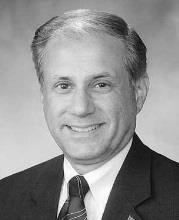 Norm Mitry brings 30+ years of experience to Heritage Valley Health System, with a unique blend of responsibilities in health care, industry, and private business. During his four years as president and CEO of Heritage Valley, he demonstrated outstanding leadership skills in developing management teams, reversing detrimental financial/operating trends, improving quality, patient safety, and introducing six sigma, while implementing key information systems to assist with the strategic decision-making process of organizations.
Norm Mitry brings 30+ years of experience to Heritage Valley Health System, with a unique blend of responsibilities in health care, industry, and private business. During his four years as president and CEO of Heritage Valley, he demonstrated outstanding leadership skills in developing management teams, reversing detrimental financial/operating trends, improving quality, patient safety, and introducing six sigma, while implementing key information systems to assist with the strategic decision-making process of organizations.Prior to joining that medical center in Beaver (pre-Heritage Valley Health System) in July 1995, he was executive vice president and chief financial officer for the Pittsburgh Mercy Health System where he worked for nine years in several positions. He served as senior vice president of finance (CFO) for medical center from July 1995 until November 1996, when he was named Chief Financial Officer of Heritage Valley Health System. In June 2001, Norm Mitry was privileged to be named president and CEO of Heritage Valley Health System. Before entering the health care field, Mitry served as manager of cost accounting and special projects for Jessop Steel in Washington, Pennsylvania.
Mitry received a bachelor of science degree in business administration from Robert Morris University and a master’s degree in public management from Carnegie Mellon University. He lives in Center Township with his wife, Peggy, and his two stepdaughters, Lauren and Kaitlin.
- 2012–2013: Robert J. Henkel
-
 Robert J. Henkel, FACHE, is the president and CEO of Ascension Health. He also serves as an executive vice president of Ascension Health Alliance. Before being named president and CEO, he served as the president of health care operations and chief operating officer at Ascension Health. Prior to 2004, he served as president of the Great Lakes and Mid-Atlantic States Operating Group at Ascension Health. In that role, he was responsible for health care operations in Connecticut; Maryland; Michigan; New York; Pennsylvania; Washington, D.C.; and Wisconsin.
Robert J. Henkel, FACHE, is the president and CEO of Ascension Health. He also serves as an executive vice president of Ascension Health Alliance. Before being named president and CEO, he served as the president of health care operations and chief operating officer at Ascension Health. Prior to 2004, he served as president of the Great Lakes and Mid-Atlantic States Operating Group at Ascension Health. In that role, he was responsible for health care operations in Connecticut; Maryland; Michigan; New York; Pennsylvania; Washington, D.C.; and Wisconsin.Henkel has held executive positions with numerous other health care organizations, including the Daughters of Charity National Health System in St. Louis, Missouri; Mount Sinai Medical Center in Miami Beach, Florida; SSM Health Care in St. Louis, Missouri; and Montefiore Medical Center in Bronx, New York.
He currently serves as a board member of the Marian Middle School Board of Directors in St. Louis, Missouri; board member of the United Way of Greater St. Louis; board member of Via Christi Health in Wichita, Kansas; board member with the Coalition to Protect America’s Health Care; advisory board member with the Ascension Health Leadership Academy; fellow of the American College of Healthcare Executives; and member of the Healthcare Executives Network. He has also served as the chairman of the Columbia St. Mary’s Board of Trustees, Milwaukee.
Henkel received a bachelor’s degree in economics from Union College, Schenectady, N.Y., and a master’s degree in public health from the University of Pittsburgh, Pennsylvania.
- 2011–2012: Cynthia Dorundo
-
 Cynthia M. Dorundo has brought to UPMC McKeesport fifteen years of experience as a former chief financial officer at St. Margaret’s and health care administrator at UPMC Shadyside. She is a graduate of the University of Pittsburgh and holds master’s degrees in business administration and health administration. She continuously shares her knowledge and expertise among all levels of the health care workforce.
Cynthia M. Dorundo has brought to UPMC McKeesport fifteen years of experience as a former chief financial officer at St. Margaret’s and health care administrator at UPMC Shadyside. She is a graduate of the University of Pittsburgh and holds master’s degrees in business administration and health administration. She continuously shares her knowledge and expertise among all levels of the health care workforce.For health care providers in at-risk communities, the financial burden, community needs, access to quality health care services, and future growth lies on the top leader of a hospital like UPMC McKeesport. Over the past two years, Dorundo has taken UPMC McKeesport in a new direction—a direction of growth and stability where previous financial losses are now producing positive bottom lines; and where partnerships are ongoing with service organizations, ambulance services, city government and local schools to address key issues and concerns within the UPMC McKeesport service area. Through her leadership, technological advancements in health care are taking place in cancer and radiation therapy, heart disease, diabetes, emergency services, and more to provide those with the highest rates of chronic illnesses in our communities the most sophisticated healthcare resources. For UPMC McKeesport and communities served by the hospital, health care technological advancements are producing the highest rankings among the hospital’s surrounding competitors. In 2010, the TRIB Total Media Daily News’ readers selected UPMC McKeesport as the top local area hospital in the Mon Valley Region. This Gold Award by the readers was made possible because of Cynthia’s outstanding leadership at UPMC McKeesport.
- 2010–2011: Michael Young
-
 Michael A. Young, president and chief executive officer of Grady Health System, brings more than 25 years of health care industry leadership to Grady Health System where he joined the health system as president/CEO in September, 2008. Young began his career at Lancaster General Hospital and Health System in Lancaster, Pennsylvania. During his tenure he built a new women’s hospital, orthopaedic hospital, and cutting-edge ambulatory services program. Most recently, he was president and CEO of Erie County Medical Center in Buffalo, New York. He was a key player in turning around ECMC’s historical operating losses to generate its first ever operating gain in 2006, a $32 million turnaround in two years. ECMC is recognized for its clinical expertise, its unusually high case mix index and unique services in burn, trauma, adolescent psychiatry, CPEP, and many other services.
Michael A. Young, president and chief executive officer of Grady Health System, brings more than 25 years of health care industry leadership to Grady Health System where he joined the health system as president/CEO in September, 2008. Young began his career at Lancaster General Hospital and Health System in Lancaster, Pennsylvania. During his tenure he built a new women’s hospital, orthopaedic hospital, and cutting-edge ambulatory services program. Most recently, he was president and CEO of Erie County Medical Center in Buffalo, New York. He was a key player in turning around ECMC’s historical operating losses to generate its first ever operating gain in 2006, a $32 million turnaround in two years. ECMC is recognized for its clinical expertise, its unusually high case mix index and unique services in burn, trauma, adolescent psychiatry, CPEP, and many other services.A native of Pennsylvania, Young received a bachelor of science in biology from the University of Pittsburgh in 1978, a master of health care administration from the University of Pittsburgh in 1979, and an executive MBA from the Harvard Business School (Advanced Management Program) in 1998. He has been a fellow in the American College of Hospital Administrators since 1994 and has produced numerous CEOs under his tutelage throughout the United States. Young has served on numerous boards of directors throughout his career providing leadership and philanthropic support. He is married and has two sons.
- 2009–2010: James Collins
-
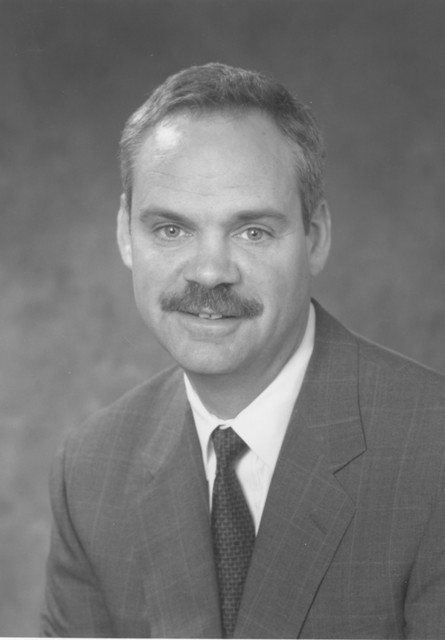 James M. Collins came to St. Clair in April 2006 as only the third president and chief executive officer in St. Clair’s 55-year history. Previously, he was president and chief executive officer of The Western Pennsylvania Hospital since 1999. Before that, Collins served since 1996 as senior vice president of Managed Care and Strategic Development for The Western Pennsylvania Healthcare System, the parent corporation of The Western Pennsylvania Hospital. From 1998, he concurrently served as president and chief executive officer of another of its subsidiaries, Suburban General Hospital.
James M. Collins came to St. Clair in April 2006 as only the third president and chief executive officer in St. Clair’s 55-year history. Previously, he was president and chief executive officer of The Western Pennsylvania Hospital since 1999. Before that, Collins served since 1996 as senior vice president of Managed Care and Strategic Development for The Western Pennsylvania Healthcare System, the parent corporation of The Western Pennsylvania Hospital. From 1998, he concurrently served as president and chief executive officer of another of its subsidiaries, Suburban General Hospital.After his residency, Collins served from 1989 to 1995 as vice president of the Western Pennsylvania Hospital, where his responsibilities included major clinical, ancillary, and support functions, as well as academic departments. In 1992, the American College of Healthcare Executives recognized him with the Regent’s Award for Early Career Achievement.
Collins earned a master’s degree in health administration in 1987 from the University of Pittsburgh, where he was a fellow at the Health Policy Institute. He also earned a bachelor’s degree from the University of Pittsburgh in 1981. He is a member of several professional organizations, including the American College of Healthcare Executives, and is currently a member of the board of directors of the United Way of Allegheny County.
- 2008–2009: Leslie Davis
-
 Leslie Davis was appointed president of Magee-Womens’ Hospital of the University of Pittsburgh Medical Center in September 2004. She has an extensive career in health care spanning over 20 years and has held prominent positions at medical centers including Mt. Sinai Medical Center (New York), Thomas Jefferson University, Hospital of the University of Pennsylvania, Philadelphia, and Tenet Pennsylvania (Graduate Hospital). She holds a bachelor’s degree from the University of South Florida and master’s degree in health and social policy from Harvard University.
Leslie Davis was appointed president of Magee-Womens’ Hospital of the University of Pittsburgh Medical Center in September 2004. She has an extensive career in health care spanning over 20 years and has held prominent positions at medical centers including Mt. Sinai Medical Center (New York), Thomas Jefferson University, Hospital of the University of Pennsylvania, Philadelphia, and Tenet Pennsylvania (Graduate Hospital). She holds a bachelor’s degree from the University of South Florida and master’s degree in health and social policy from Harvard University.In her position as president, Davis enhances Magee’s vision and reputation for providing health care and services in Western Pennsylvania. Nearly 9,000 babies are born at Magee-Womens Hospital each year, accounting for close to 50 percent of all births to women living in Allegheny County. Magee is also the regional referral center for high-risk maternal care for Western Pennsylvania. The hospital’s neonatal intensive care unit is the largest in Pennsylvania and treats more than 1,000 seriously or critically ill newborns annually. Magee also has nationally recognized clinical and research programs in breast and gynecological cancers, genetics, infectious diseases, and reproductive endocrinology. Magee expanded its medical and surgical services to provide broader, more comprehensive care for women. Gender-based programs in internal medicine and medicine subspecialties such as cardiology, rheumatology, lupus, gastroenterology, and digestive disorders, along with general surgery, thoracic, vascular, and colorectal surgery, minimally invasive surgery, bariatrics, a Center for Continence and Pelvic Floor Disorders, and orthopedic surgery are now offered at Magee.
- 2007–2008: Thomas Priselac
-
 Thomas M. Priselac is president and chief executive officer of the Cedars-Sinai Health System—a position he has held since January 1994. He has been associated with Cedars-Sinai since 1979. Prior to being named president and CEO, he was executive vice president from 1988 to 1993. Before joining Cedars-Sinai, he was on the executive staff of Montefiore Hospital in Pittsburgh. He has served on many boards in the health care field and currently serves as the immediate past chair of the Association of American Medical Colleges. He also is a member of both the Los Angeles Chamber of Commerce board, where he chairs the Health Care Committee, and the Charles R. Drew University board. A past member of the American Hospital Association Board of Directors, he also formerly chaired the Hospital Association of Southern California, the California Healthcare Association, and the Association of American Medical Colleges Council of Teaching Hospitals. He also serves as an adjunct professor at the UCLA School of Public Health.
Thomas M. Priselac is president and chief executive officer of the Cedars-Sinai Health System—a position he has held since January 1994. He has been associated with Cedars-Sinai since 1979. Prior to being named president and CEO, he was executive vice president from 1988 to 1993. Before joining Cedars-Sinai, he was on the executive staff of Montefiore Hospital in Pittsburgh. He has served on many boards in the health care field and currently serves as the immediate past chair of the Association of American Medical Colleges. He also is a member of both the Los Angeles Chamber of Commerce board, where he chairs the Health Care Committee, and the Charles R. Drew University board. A past member of the American Hospital Association Board of Directors, he also formerly chaired the Hospital Association of Southern California, the California Healthcare Association, and the Association of American Medical Colleges Council of Teaching Hospitals. He also serves as an adjunct professor at the UCLA School of Public Health.Priselac is an author and invited speaker on a variety of contemporary issues facing the health care field today, including policy issues related to the delivery and financing of health care, health care quality and safety, and the adoption and implementation of information technology. He is the holder of the Warschaw/Law endowed Chair in Healthcare Leadership at Cedars-Sinai Medical Center, among the nation’s leading providers of health care services, medical education, and research. Physician services are provided through the Cedars-Sinai Medical Care Foundation, a full-time academic faculty, and an active private attending staff. Cedars-Sinai Medical Center, with revenues of over $1.7 billion, is the largest private hospital in the western United States and provides a full range of acute inpatient care services, rehabilitation medicine, and extensive outpatient diagnostic and treatment services. Cedars-Sinai conducts NIH and privately funded research, valued at approximately $65 million, on a broad range of research topics. The medical center also conducts graduate medical education in a broad range of specialties for over 310 residents and fellows.
A native of Pennsylvania, Priselac obtained a bachelor’s degree in biology from Washington and Jefferson College in Pennsylvania, and a master’s in public health, health services administration, and planning from the University of Pittsburgh.
- 2006–2007: David Hunter
-
 David Hunter is the former chairman of Navigant Consulting, Inc.’s Healthcare Management Committee. He has directed The Hunter Group (a unit of Navigant Consulting, Inc.)’s most complex projects involving academic medical centers, public hospitals, large systems, networks, HMOs, and large medical group practices. Building on the firm’s strong base of hospital turnarounds and interim management, he has been credited with leading-edge undertakings, including: development of regional networks, innovative structured relationships between the public and private sector, integration of providers and payers, sustainable system-wide performance improvements, and strategic positioning.
David Hunter is the former chairman of Navigant Consulting, Inc.’s Healthcare Management Committee. He has directed The Hunter Group (a unit of Navigant Consulting, Inc.)’s most complex projects involving academic medical centers, public hospitals, large systems, networks, HMOs, and large medical group practices. Building on the firm’s strong base of hospital turnarounds and interim management, he has been credited with leading-edge undertakings, including: development of regional networks, innovative structured relationships between the public and private sector, integration of providers and payers, sustainable system-wide performance improvements, and strategic positioning.Sample projects include...
- Providing court-approved interim management/consulting support following one of the largest bankruptcies in health care—AHERF in Pennsylvania.
- Helping several campuses of the University of California system evaluate and pursue various strategic relationships as well as operational and financial performance improvements.
- Dramatic performance improvements of several urban academic medical centers, including George Washington University and New England Medical Center.
- Consolidation of three hospitals and identification of $50 million of performance improvements for Legacy Health System of Portland, Oregon, as well as facilitating a payor provider alliance of Legacy, Blue Cross and Blue Shield of Oregon, and physician groups.
- Creation of the vision, model, and business plan for two large IDNs—for BayCare, a three-county regional delivery system in the Tampa Bay area, and the West Virginia statewide health care organization.
- Development of a regional integration plan and performance improvement plan for Henry Ford Health System, Detroit, Michigan.
- Merger analysis and/or implementation for Morton Plant Health System/Mease Health Care, Florida; Mercy Health Services in Farmington Hills, Michigan; UCSF Medical Center/Mount Zion Medical Center, UCSF; and California Pacific Medical Center and UCLA Medical Center/Santa Monica Hospital.
- A $70 million performance improvement for California Pacific Medical Center and several significant performance improvement projects for Catholic Healthcare West.
- Turn-around and interim management team for Detroit Medical Center. Performance improvement plans for UMass Memorial Healthcare and VCU Health System.
Hunter has been a leader in the health care field for more than 25 years. Among other positions, he held senior management positions at Durham County Hospital Corporation and Duke University Medical Center, and simultaneously held faculty appointments at the University. He was also chief executive officer of Memorial Hospital at Burlington County in Mt. Holly, NJ, and later assumed this role for Memorial’s parent company, the Nexus Health Care Corporation. He lectures and presents throughout the country on timely issues in health care with a focus on hospitals and health systems in academic medical centers, physician groups, and community and specialty hospitals. He received a bachelor of science degree in economics and business administration from Ursinus College, and a master’s of public health from the University of Pittsburgh.
- 2005–2006: Thomas Timcho
-
 Thomas P. Timcho held the position of president and chief executive officer of Jefferson Regional Medical Center (JRMC), Pittsburgh, Pennsylvania. JRMC is a fully-accredited 376-bed, non-profit, acute medical care facility offering inpatient, outpatient, and 24-hour emergency services. Timcho has a long history of service to Jefferson Regional Medical Center and, prior to his current position, has held positions of interim president and chief executive officer, executive vice president, and chief operating officer and senior vice president and chief financial officer.
Thomas P. Timcho held the position of president and chief executive officer of Jefferson Regional Medical Center (JRMC), Pittsburgh, Pennsylvania. JRMC is a fully-accredited 376-bed, non-profit, acute medical care facility offering inpatient, outpatient, and 24-hour emergency services. Timcho has a long history of service to Jefferson Regional Medical Center and, prior to his current position, has held positions of interim president and chief executive officer, executive vice president, and chief operating officer and senior vice president and chief financial officer.Prior to his service with JRMC, Timcho served as principal for Primesolutions Healthcare, LLC.; senior vice president for Pitts Management Associates, Inc.; senior vice president and CFO for Alliance Home Health Inc.; president and CEO of UPMC Beaver Valley Hospital; president of the UPMC University Services Organization (USO); associate vice president of managed care, UPMC; executive vice president and CFO for Children’s Hospital of Pittsburgh; executive responsible for the Healthcare Consulting Group, Ernst and Young Consulting. He has served with distinction in the U.S. Army and holds a master’s of business administration from the University of Pittsburgh.
- 2003–2005: Michael Blackwood
-
 Michael Blackwood is currently president and CEO of Gateway Health Plan. He has held positions as president of The Pilot Group, which is a health care consulting firm specializing in managed care; president, CEO, and board member of Health America Pennsylvania, Inc.; and assistant administrator of Montefiore Hospital. Blackwood has served as a captain in the Medical Service Corp, United States Army. He obtained a master of public health degree in 1980 from Pitt Public Health’s Department of Health Policy and Management, University of Pittsburgh, and a BA in psychology in 1971 from Louisiana State University, Baton Rouge. Blackwood’s professional affiliations also include service as an adjunct associate professor, H. John Heinz III School of Public Policy and Management, Carnegie Mellon University, Pittsburgh, Pennsylvania. He taught the course Practical Aspects of Managed Care at the Graduate School of Public Health for three years; Delta Omega Public Health Honor Society-Omicron Chapter (elected member); board of directors, Pittsburgh Symphony, 1994-96; board of directors, Orr Compassionate Care Center, 1995-98; board of advisors, Health Policy Institute, Pitt Public Health; policy board, Pennsylvania Department of Health; Highmark Blue Cross/Blue Shield Foundation Board.
Michael Blackwood is currently president and CEO of Gateway Health Plan. He has held positions as president of The Pilot Group, which is a health care consulting firm specializing in managed care; president, CEO, and board member of Health America Pennsylvania, Inc.; and assistant administrator of Montefiore Hospital. Blackwood has served as a captain in the Medical Service Corp, United States Army. He obtained a master of public health degree in 1980 from Pitt Public Health’s Department of Health Policy and Management, University of Pittsburgh, and a BA in psychology in 1971 from Louisiana State University, Baton Rouge. Blackwood’s professional affiliations also include service as an adjunct associate professor, H. John Heinz III School of Public Policy and Management, Carnegie Mellon University, Pittsburgh, Pennsylvania. He taught the course Practical Aspects of Managed Care at the Graduate School of Public Health for three years; Delta Omega Public Health Honor Society-Omicron Chapter (elected member); board of directors, Pittsburgh Symphony, 1994-96; board of directors, Orr Compassionate Care Center, 1995-98; board of advisors, Health Policy Institute, Pitt Public Health; policy board, Pennsylvania Department of Health; Highmark Blue Cross/Blue Shield Foundation Board.Blackwood’s awards include a Distinguished Alumni Award, University of Pittsburgh Graduate School of Public Health, 1992; in 1999, selected as one of 50 Pitt Public Health’s “significant contributors” to the field of public health since School’s inception in 1949; HEW Traineeship (full grant) recipient, Pitt Public Health, 1976–77; Meritorious Service Medal, Medical Service Corps, United States Army, 1976; distinguished military graduate, LSU, 1971.
- 2002–2003: John Zanardelli
-
 John Zanardelli, the program’s inaugural Executive-in-Residence, was the executive director and chief executive officer for United Methodist Services for the Aging (UMSA). He held this position beginning May of 1993 and had 26 years of experience in health care organizations. Prior to his appointment as executive director of UMSA, he served as division executive director for Presbyterian Association on Aging (now Presbyterian Seniorcare), COO of Southwood Psychiatric Hospital, COO of Grane Healthcare of Pittsburgh, and senior operations officer at Oil City Area Health Center. Zanardelli received his master’s degree in public health in health administration from the University of Pittsburgh Graduate School of Public Health, and was formerly a licensed nursing home administrator in Pennsylvania. He is a fellow in the American College of Healthcare Executives and is active in a number of professional and teaching community service roles. He is a member of Delta Omega, the National Public Health Honor Society, and served as president of the Omicron Chapter.
John Zanardelli, the program’s inaugural Executive-in-Residence, was the executive director and chief executive officer for United Methodist Services for the Aging (UMSA). He held this position beginning May of 1993 and had 26 years of experience in health care organizations. Prior to his appointment as executive director of UMSA, he served as division executive director for Presbyterian Association on Aging (now Presbyterian Seniorcare), COO of Southwood Psychiatric Hospital, COO of Grane Healthcare of Pittsburgh, and senior operations officer at Oil City Area Health Center. Zanardelli received his master’s degree in public health in health administration from the University of Pittsburgh Graduate School of Public Health, and was formerly a licensed nursing home administrator in Pennsylvania. He is a fellow in the American College of Healthcare Executives and is active in a number of professional and teaching community service roles. He is a member of Delta Omega, the National Public Health Honor Society, and served as president of the Omicron Chapter.Hunter has been a leader in the health care field for more than 25 years. Among other positions, he held senior management positions at Durham County Hospital Corporation and Duke University Medical Center, and simultaneously held faculty appointments at the University. He was also chief executive officer of Memorial Hospital at Burlington County in Mt. Holly, NJ, and later assumed this role for Memorial’s parent company, the Nexus Health Care Corporation. He lectures and presents throughout the country on timely issues in health care with a focus on hospitals and health systems in academic medical centers, physician groups, and community and specialty hospitals. He received a bachelor of science degree in economics and business administration from Ursinus College, and a master’s of public health from the University of Pittsburgh.
Bios of past executives are presented above as they stood during the time of their executive residency.